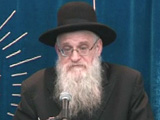17
On the other hand, all yeshivot close their doors from Rosh Chodesh Nissan, because cleaning for Pesach, like many mitzvot, is about "being religious" or G-dly, even if they don't get most of us to "feel religious". Similarly, when remembering to wait 6 hours, or stopping in the middle of a good joke upon remembering that it's Lashon HaRah, or even while observing Shabbat, often Judaism teaches that being religious is no less important than "feeling religious".
Once a Ba'al Teshuva called me about 15 minutes before candle-lighting, upon being informed that you're not allowed to play guitar on Shabbat. He somehow heard that I use music as an educational means, and figured I could "find him a leniency" for his religious predicament. He explained that as a follower of R. Shlomo Carlebach, his singing with his guitar is the spiritual climax of his Shabbat, and he was not willing to "take no for an answer". As Shabbat came closer, I had no choice but to starkly present his problem, and asked him, "What would you say if I told you that wearing a cross makes me feel more spiritual? I might "feel more religious", but it is the wrong religion!"
Similarly, often a sick person feels wrong when the doctor and rabbi insist that he not fast on Yom Kippur. Yes, it doesn't "feel religious" to eat on that day, but Judaism is based upon many G-dly actions (including saving life), many of which only activate our religious feeling upon learning the deeper or kabbalistic aspects of those mitzvot. Nevertheless, we "give G-d credit", that they are worthwhile and beneficial nationally, morally & spiritually even if at present we don't understand how brushing my teeth the right way on Shabbat makes me more G-dly. True, the Samaritans told me they will not eat on Yom Kippur or drive in an ambulance on Shabbat, and self-righteously tell us "we are more religious than you, and don't just observe mitzvot when they're easy!". On the level of a 5th grader, I could understand them. But a more knowledgeable Jew knows that when seriously ill, it's precisely MORE religious to eat on Yom Kippur or drive to the hospital or in an IDF patrol on Shabbat.
One of the major problems among many Haredim is their claim "we feel more religious learning in yeshiva than serving in the IDF". Again, even if I can sympathize with the rationale of that claim on some level, nevertheless after the halacha clearly states that every healthy Jewish man must actively participate when Am Yisrael is in danger, before worrying about "feeling religious", one should first "be religious". We are not Christians nor Samaritans, and rather than me deciding, we are better off letting Hashem, the prophets (who all went to war, e.g. Shoftim 5), the Talmud (Sotah 44a), Rambam (hil. Shabbat ch. 2; M'lachim u'Milchamoteihem 7, 4 & 5, 1) and Shulchan Aruch (Or. Ch. 329), as well as any rabbi who knows and appreciates the needs of the IDF, decide what is "more religious" when Am Yisrael needs combat soldiers.
Shabbat Shalom & Chag Same'ach!! Rav Ari Shvat (Chwat)

Rabbi Ari Shvat
Lectures at various yeshivot, michlalot and midrashot. Has published many books & Torani articles and is in charge of Rav Kook’s archives.
Listen to Your Godly Inner Nature
Ein Aya Shabat Chapter A Paragraph 20
5770

The Kedusha of Am Yisrael and Eretz Yisrael
Iyar 16 5780

The 4 Who Never Sinned
Rav Kook explains the Initial - Inevitable Flawlessness of Israel .
18 Sivan 5784
Serving Israel is Serving G-d and the Universe
Ein Aya Shabat Chapter B Paragraph 45
Kislev 8 5775

Tzeniut in the light of the Maharal
Adapted from Netivot Olam
Rabbi Eliezer Ben-Porat | 5771

Keeping Kosher - Eating Out
Rabbi David Sperling

Menachem Mendel of Vitebsk: The Pioneering Rebbe
Rabbi Eliezer Melamed | Iyar, 5763








